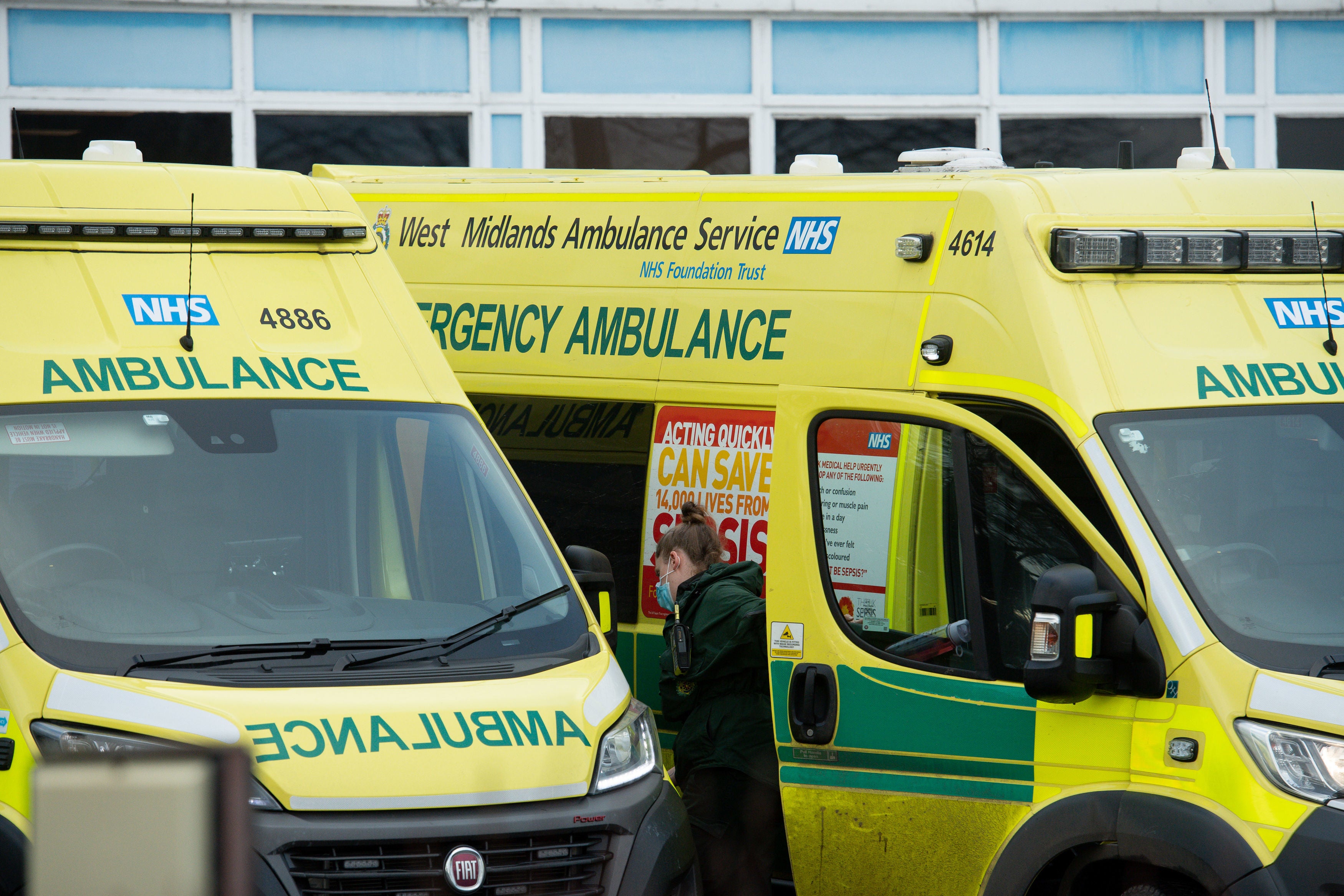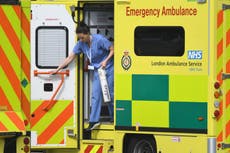Hundreds of 999 calls left waiting across West Midlands as bosses warn of ‘toughest weeks’ ahead
Emergency calls in other parts of country have had gone up to 10 hours without response

A surge in 999 calls and delays handing over patients to overstretched hospitals is leaving hundreds facing long waits for ambulances in the West Midlands, bosses have warned.
At one stage on Tuesday just under 300 patients were waiting for a paramedic, with the numbers waiting by 8pm last night still at more than 200.
Ambulances have been delayed for hours outside some A&Es, with patients forced to wait in the back of the vehicles.
As Covid cases continue to soar in the UK, West Midlands ambulance service (WMAS) saw the busiest day in its history on Monday with 5,383 calls, 30 per cent more than the same day last year.
In a message to staff on Tuesday, seen by The Independent, the service’s chief executive Antony Marsh told staff: “The next few weeks are likely to be some of the toughest we have faced.
“In the West Midlands, hospitals are under sustained pressure with many more Covid-19 patients than during the peak of the first wave of cases in April last year.
“For us at West Midlands Ambulance Service, we are facing increasing call numbers and longer handover delays than at any time in the past, which has led to some patients waiting far longer than we would have hoped and lower category calls stacking for large parts of the day, every day.”
Hundreds of paramedic students have been drafted in to help drive ambulances while other staff have been redeployed to the front line.
In London, paramedics have warned they are no longer coping with the demand from patients as the London ambulance service received almost 700 calls on Monday night. Leaked data showed some emergency calls, needing a response within 18 minutes, were waiting for up to 10 hours.
In the southeast of England, south east coast ambulance service (Secas) said it was no longer able to guarantee an emergency response to women giving birth at home or in one of the region’s three standalone birth centres. London ambulance service issued a similar warning before Christmas.
One of the biggest problems in the West Midlands is the delays at hospital emergency departments which are being forced to keep many patients waiting in the back of ambulances because of a shortage of space and beds as a result of soaring coronavirus infections and the need to keep patients apart.
One paramedic for the West Midlands service, Josh Miller, told Sky News there were “big problems” around the country.
“The biggest risk is to the patients who are waiting in the community because ambulances are not able to offload and go out and answer further 999 calls.”
Another member of staff, Karl Williams, said Monday was one of his busiest shifts during the pandemic. On social media he described administering eight oxygen masks and four oxygen tanks in just 12 hours, adding there were “220 jobs outstanding with no ambulance to send" and “three-hour waits just to get our patient into A&E”.
In his message to staff, Mr Marsh said a meeting of senior managers on Monday night had led to difficult decisions being taken to “to protect staff and patients alike”.
The measures include bringing in 155 students to help drive ambulances, postponing paramedic training for more than 100 ambulance technicians and offering roles to 230 students who started university training in September to help transport patients after being discharged from hospital.
The service has also given extra training to volunteer first responders and asked research staff, tutors and corporate staff to work on the front line or in call centres.
Mr Marsh said it was hoped this would bring in an extra 500 staff.
He added: “The next few weeks are likely to be some of the toughest we have faced, but by us all pulling together, we will make the difference and protect staff, patients and save lives.
“The fact that we are continuing to provide such a high quality service despite the most testing time we have ever faced is down to the incredible efforts each and every one of you is making within this trust – it really is a whole organisational effort and would not be possible without everyone pulling together.”
Across the southeast hospitals have suspended home births and midwifery led units because of “significant pressure” on its ambulance service.
A spokesperson for Secas said: "Due to the current pressures we are experiencing across our urgent and emergency care services, we are no longer in a position to guarantee an ambulance response to those women choosing to plan their birth at home or within one of the three stand-alone birth centres in the region.
"As an ambulance trust, we always prioritise our the most seriously ill and injured patients. In light of the current operational pressures we are facing, we need to reduce the amount of planned activity that may require emergency ambulance transfer.
"Within maternity services this relates to homebirths and stand-alone birth centres."
A West Midlands ambulance service spokesperson said: “The trust is facing extremely high demand and on Monday received more than 5,300 calls – the busiest day in the trust’s history.
“We are substantially increasing the number of staff available to respond to patients but it is important that the public play their part too by observing social distancing and the government’s hands, face, space advice.”
Join our commenting forum
Join thought-provoking conversations, follow other Independent readers and see their replies
Comments


Bookmark popover
Removed from bookmarks